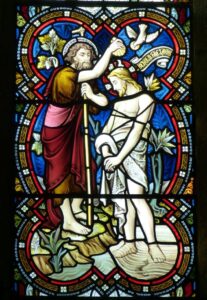Kingdom Now: Jesus and the Kingdom

In the Introduction to When Heaven Invades Earth, Bill Johnson said he grew up hearing stories about the great moves of God. He is a fifth-generation pastor on his father’s side, and a fourth-generation pastor on his mother’s side. He said his grandparents sat under the ministry of “notable revivalists” like Smith Wigglesworth. His heart burned for the coming move of God, which he believed would surpass all previous moves of God and bring “more than one billion souls into the Kingdom.” But exactly what does Bill Johnson mean by the Kingdom?
Johnson said we were created in the image of God and placed into the Garden of Eden—”the Father’s ultimate expression of beauty and peace.” Outside of the Garden was a different story; it was without order and blessing and needed to be subdued. Adam and Eve were placed in the Garden and commissioned by God to be fruitful and multiply, to fill the earth and subdue it; to have dominion over all the earth, and all the creatures on the earth (Genesis 1:26-28). For Johnson, this was the original commission of mankind. He thought it was obvious why the world outside the Garden needed to be subdued—“it was under the influence of darkness.” Johnson said: “Satan had rebelled and been cast out of heaven, and with him a portion of the fallen angels took dominion of the earth” (p. 30).
In support of this Johnson cited Genesis 1:2, where it says: “The earth was without form and void, and darkness was over the face of the deep. And the Spirit of God was hovering over the face of the waters.” He assumed, without explanation, what is called the gap theory of creation, which was popularized by the Scofield Bible, first published in 1909. According to the Dictionary of Christianity and Science, the theory holds there was a “gap” between Genesis 1:1 and 1:2. After the first creation in Genesis 1:1, Satan (who was the ruler of the pre-Adamic world) rebelled, which led to sin entering the creation and brought God’s judgement in the form of a flood (the water in Genesis 1:2) and a global ice age.
This resulted in the earth then being without form and void, tohu wabohu in Hebrew. “Genesis 1:2 thus describes the ruined condition of the earth, while Genesis 1:3-31 describes God’s re-creation.” This creation theory is fundamental to Johnson’s portrayal of the creation and mission of humankind: “created in His image, for intimacy, that the dominion might be expressed through love. It is from this revelation that we are to learn to walk as His ambassadors, thus defeating the ‘Prince of this world.’” According to Johnson, mankind lost the authority to rule when Adam ate the forbidden fruit “and mankind became the slave and possession of the Evil One.”
By redeeming man, Jesus retrieved what man had given to Satan. “The original plan was never aborted,” but was fully realized in the resurrection and ascension of Christ. We were born to rule over creation and darkness; “to plunder hell and establish the rule of Jesus wherever we go by preaching the gospel of the Kingdom. Kingdom means King’s domain.” The world was infected by darkness in the form of disease, sickness, afflicting spirits, poverty, natural disasters, demonic influence, and more; and humankind is to take back that dominion.
Our rule is still over creation, but now it is focused on exposing and undoing the works of the devil. We are to give what we have received to reach that end. If I truly receive power from an encounter with the God of power, I am equipped to give it away. The invasion of God into impossible situations come through a people who have received power from on high and learn to release it into the circumstances of life. (pp. 32-33)
Supposedly, when Jesus the Messiah came and proclaimed his primary message, “Repent, for the kingdom of heaven is at hand” (Matthew 4:17), he brought his world with him. Johnson said Jesus came to offer the benefit of his world to anyone who would surrender to his rule. “The realm of God’s dominion, that realm of all sufficiency, is the realm called the Kingdom. The benefits of His rule were illustrated through his works of forgiveness, deliverance and healing.” As it says in the Lord’s Model Prayer, “Your kingdom come, Your will be done on earth as it is in heaven.”
The Kingdom of God in the New Testament
The kingdom of God or the kingdom of heaven is the central theme of Jesus’ preaching in the Synoptic Gospels of Matthew, Mark and Luke. The terms are interchangeable. Matthew speaks of the ‘kingdom of heaven’ because he was writing to a Jewish audience, who tended to avoid direct reference to God. Even in modern Judaism, the name of G-d is handled with caution and respect. Mark and Luke speak of the ‘kingdom of God’ because it was more intelligible to non-Jews. Neither phrase is found in the Old Testament and only the ‘kingdom of God’ is found in the New Testament outside of the gospel of Matthew.
The universal church alone contains citizens of the kingdom of God. Herman Ridderbos said there is a connection between the kingdom of God and the church, but they weren’t identical. He suggested we think of the relationship between the church and the kingdom as two concentric circles, with the church as the smaller one and the kingdom of God as the larger, with Christ as the center of both. “The kingdom is the whole of God’s redeeming activity in Christ in this world; the church is the assembly of those who belong to Jesus Christ.” Ridderbos further said:
The church, as the organ of the kingdom, is called to confess Jesus as the Christ, to the missionary task of preaching the gospel in the world; she is also the community of those who wait for the coming of the kingdom in glory, the servants who have received their Lord’s talents in prospect of his return. The church receives her whole constitution from the kingdom, on all sides she is beset and directed by the revelation, the progress, the future coming of the kingdom of God, without at any time being the kingdom herself or even being identified with it.
For first-century Jews, the coming of the Messiah was to pave the way for the kingdom of God; he was “to restore his people’s fortunes and liberate them from the power of their enemies.” This was a misunderstanding of God’s redemptive purpose. It was a stumbling block to Jesus’ disciples (particularly Peter and Judas), to John the Baptist, Nicodemus and other Jews at the time of Jesus’ ministry. In the New Testament, John the Baptist announced the kingdom of heaven was at hand (Matthew 3:2); and Jesus began his preaching with the same message (Matthew 4:17). But they both gave it a sense that was at odds with the legalistic and nationalistic concerns of their time.
In John’s preaching, the announcement of divine judgment was prominent. John said the axe was already laid to the root of the trees. Every tree that didn’t bear good fruit would be torn down and thrown into the fire. Yet John said he was not the promised Messiah, who would come after him. The Messiah would hold the winnowing fork in his hand, and would baptize them with the Holy Spirit and fire. Therefore, the people must repent and submit to baptism for the washing away of their sins, in order to escape the coming wrath. God’s coming as King was above all else to purify, sift and judge and no one could evade this judgment. According to Ridderbos:
In view of his coming [the Messiah] the people must repent and submit to baptism for the washing away of sins, so as to escape the coming wrath and participate in the salvation of the kingdom and the baptism with the Holy Spirit which will be poured out when it comes.
From the beginning of his ministry Jesus didn’t act like the Jews expected their Messiah would act. After a while, even John the Baptist began question whether Jesus was the Messiah. So, John sent his disciples to ask Jesus if he was the one who is to come. Jesus told John’s disciples to tell John what they have seen and heard: that the blind see, the lame walk, lepers are cleansed, the deaf hear, the dead are raised and the poor have good news preached to them (Matthew 11:5; Luke 7:22). These were all signs of the presence of the kingdom of God—of God’s rule being established.
This present aspect of the kingdom of God is seen more specifically when Jesus casts out demons. In Matthew 12, Jesus is accused by the Pharisees of casting out demons by Beelzebul, the prince of demons. He replied if he casts out demons by Beelzebul, then by whom do their sons cast him out? “But if it is by the Spirit of God that I cast out demons, then the kingdom of God has come upon you” (Matthew 12:28). Miracles like these are visual enactments of the claim of God’s rule and authority has over all opposing powers; and where God’s rule is established, the kingdom has come. Ridderbos further said:
The kingdom of heaven breaks into the domain of the evil one. The power of Satan is broken. Jesus sees him fall like lightning from heaven. He possesses and bestows power to trample on the dominion of the enemy. Nothing can be impossible for those who go forth into the world, invested with Jesus’ power, as witnesses of the kingdom (Luke 10:18f.). The entirety of Jesus’ miraculous ministry is the proof of the coming of the kingdom.
But, at the same time the kingdom of God is in the here and now of the gospel, it is also future. Miracles and healings described above are a foretaste of what is to come. They are tokens of a future order of reality, not the present one. In Matthew 8:29, where Jesus cast out the demons into a herd of pigs, the demons said, “Have you come here to torment us before the time?” In the Olivet Discourse of Mark 13:21-23, Jesus told his disciples that before the end, they should be aware there will be false christs and false prophets performing signs and wonders to attempt to lead astray the elect.
There are both present and future aspects of the one kingdom of God, not two kingdoms. Richard Gaffin said this one kingdom comes in three successive stages: “a. the period of Jesus’ earthly ministry, b. the period from his exaltation to his return (the time of the church), and c. the period beyond his return.” Origen said Jesus was therefore autobasileia, the kingdom in person. The person of Christ is essential to properly understand the kingdom of God. We have the privilege of living out and provisionally showing the reality of that kingdom as the church, the body of Christ, until the time of his return. Jesus has come; He is present; and He will come again. The miracles done by Jesus are intimately tied to his kingdom and his return.
Jesus is the Christ, the embodiment of the kingdom of God. Not only did he proclaim the kingdom he identified himself with it. He is Immanuel, God with us. When the Pharisees asked Jesus when the kingdom of God would come, he said, “the kingdom of God is in the midst of you” (Luke 17:21). The (future) kingdom is present in Jesus. So, when we pray, “thy kingdom come,” in the Lord’s Prayer, we are actually praying for Jesus to come. The age to come began with the resurrection; it was inaugurated while the present age continues. This is the basis of the already/not yet nature of the kingdom. Understanding that Jesus Christ is the embodiment of the Kingdom becomes a crucial point when examining misuses of the Kingdom of God. Paul said: “I tell you this, brothers: flesh and blood cannot inherit the kingdom of God, nor does the perishable inherit the imperishable.” (1 Cor. 15:50)
Bill Johnson appears to separate what should not be separated: Jesus and the kingdom of God.
The discussion of the kingdom of God was based on articles by Herman Ridderbos (“Kingdom of God, Kingdom of Heaven” in The New Bible Dictionary, 3rd edition) and Richard Gaffin (“Kingdom of God” in the New Dictionary of Theology).


